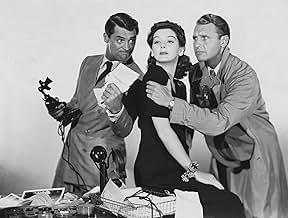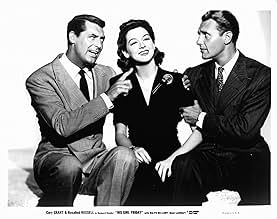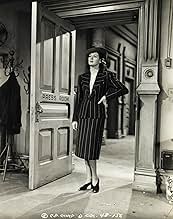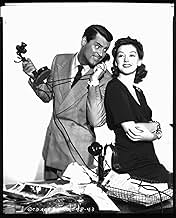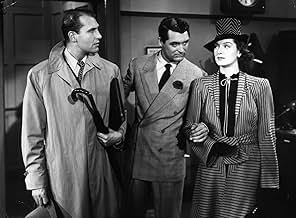Quando l'abile reporter Hildy Johnson annuncia di voler lasciare il mondo del giornalismo per dedicarsi completamente alla vita domestica, il suo editore, nonchè ex-marito, ricorre ad ogni m... Leggi tuttoQuando l'abile reporter Hildy Johnson annuncia di voler lasciare il mondo del giornalismo per dedicarsi completamente alla vita domestica, il suo editore, nonchè ex-marito, ricorre ad ogni mezzo per convincerla del contrario e per conquistare di nuovo il suo cuore.Quando l'abile reporter Hildy Johnson annuncia di voler lasciare il mondo del giornalismo per dedicarsi completamente alla vita domestica, il suo editore, nonchè ex-marito, ricorre ad ogni mezzo per convincerla del contrario e per conquistare di nuovo il suo cuore.
- Regia
- Sceneggiatura
- Star
- Premi
- 5 vittorie e 1 candidatura in totale
Recensioni in evidenza
There had been an earlier version of the play in the 1930s called THE FRONT PAGE, starring Adolphe Menjou as the conniving and devious Walter Burns, and Pat O'Brien as ace reporter Hildy Johnson. It is a good version, and both stars do well with their parts (and both have the verbal speed necessary for the dialog to flow over the ears of the audience). But when the film was remade in 1940, Howard Hawks decided to redraw Hildy Johnson into a female reporter (and previous wife) of Burns. His casting of Cary Grant was radically different too. Burns is a nasty, conniving s.o.b. who would kill for a good story. Menjou was somewhat dapper (he was usually dapper) in the role, but the hardness under the presentable shell was there. And by changing Hildy from a guy to a gal, and Walter's former wife, you had to make Walter look more interesting. So Walter is turned into Cary Grant. There was a search for Hildy, involving Jean Arthur and Irene Dunne as possibilities. Neither ended up playing him. Instead it went to Rosalind Russell.
It has to be admitted Russell had the vocal abilities to push the dialog at the proper clip. Possibly Jean Arthur could have done that just as well, but Arthur did not have the apparent physical strength behind the stylishness that Russell showed. She really does balance well (in this film) with Grant, given their characters.
Motivation changes a little. This Walter Burns still wants to get his scoops, but there are moments of fragility when he realizes he may forever lose Hildy to her fiancé Bruce (the ever helpless Ralph Bellamy). And they oddly work (Hawks manages to keep them under control). Also, as the story is now twelve years older than the original play, certain changes occur in Walter's political views. He does dislike the gang (led by Clarence Kolb and Gene Lockhart) running the city, and points out to Hildy that they have a chance to help give the city the sort of government New York City has under La Guardia. This does not end his joy at scooping the opposition, but it does suggest that Burns has more depth.
It is now generally believed that this is the best of the film versions of THE FRONT PAGE, and one of the funniest films ever made. The entire cast shines (look at the scene where Helen Mack confronts the reporters who have made her look like a tramp, and have told lies about John Qualen (Williams) - she is in a state when Russell takes her out of the press room, and the reporters are thoroughly ashamed of herself - and Russell comes back looking at Regis Toomey, Porter Hall, and the others, and says "Gentlemen of the Press!" with heavy cynical irony). And also note Billy Gilbert's immortal Joe Pettibone, the most hopeless monument of total befuddlement in movies. It is one of the few film comedies of that period that retains it's laughs one viewing following another.
Grant plays the conniving newspaper publisher Walter Johnson, and Rosalind Russell is the reporter Hildy Johnson, a woman this time, and Johnson's ex-wife. She's trying to get remarried, move to Albany, and quit the newspaper business, but Walter can't bear it.
He cons her into helping out with a controversial death row case and then makes sure her fiancée (Ralph Bellamy) suffers a series of mishaps - arrest for stealing a watch, arrest for "mashing," arrest for counterfeiting, and the theft of his wallet.
This all happens while Hildy interviews Earl Williams, a man due to be hung the next day... and then hides him in a roll-top desk in the courthouse press room when he escapes during a psychiatric evaluation.
It's madcap, all right, and there are no two better people to carry it off than Grant and Russell, who make a great team. It's a hilarious story, with the most rapid-fire, non-stop dialog ever heard anywhere, often with several conversations going on at once. It's exhausting trying to keep up with it.
Strangely, without computers and cell phones, the story of journalists working on a story holds up because the emotions and activities are realistic and still go on. It's as Hildy describes - no set schedule, no normal meals, and long hours. Nothing much has changed.
This is a frenetic comedy, and while the impending hanging of Earl Williams is certainly serious, this plot is more of an excuse to observe the machinations of Hildy and Walter - it's a subplot, though it drives the main story.
"The Front Page" is a favorite of Hollywood's, remade many times - three versions under its original title, a TV series, two TV productions, plus the film "Switching Channels." And of course, "His Girl Friday," possibly the best of all of them.
Director Howard Hawks wanted to show the whirlwind pace of the newsroom in the criminal courts system so he had his actors overlap their lines -- so much so that at times it seems as though everyone is talking at once; it even gets difficult to understand all that is going on.
He also had the cast move FAST so the film looks totally frenetic from scene to scene with no respite -- either from the laughs or from the action.
There are two really good "inside" jokes in the script: The first is where Walter Burns (Grant) is describing Hildy's fiancee and says that "he looks like that guy in the movies -- Bellamy," Well, it WAS Ralph Bellamy playing that part!
The other is when Burns says something about someone he once knew named "Archie Leach" which just happens to be Cary Grant's real name.
This is one of the true gems of Hollywood's most prolific era. It has incredible pacing, acting, photography and an authentic gritty feeling that would be associated with hard-boiled, "anything for a story" newspaper people.
It has long been one of my favorite films and deserves to be watched over and over again -- just for all the dialogue and great acting that may have gone by so fast you missed it the first time.
Cary Grant and Rosalind Russell were a brilliant screen pair (indeed, it seems that no one was bad casting when paired with Cary Grant) as rival reporters in a furiously paced news office. Russell is the odd man, or should I say odd girl, out, due to her lack of a penis, but she proves herself more than capable of holding her own with the boys.
Russell charges across the screen and never loses momentum for a second. She's goofy, sexy and hysterical. The funniest moment in the film comes when she's chasing a man down the street (I won't go into details) and dive tackles him to the ground.
One of the first films from the 40s and a highlight of the decade.
Grade: A+
making it possible for me to watch it in such pristine condition! (I've got the 2002 edition, and from what I've heard you should beware of earlier DVD issues).
Lo sapevi?
- QuizIt is estimated that the normal rate of verbal dialogue in most films is around 90 words a minute. In La signora del venerdì (1940), the delivery has been clocked at 240 words a minute.
- BlooperWhen Bruce Baldwin comes to the press room late in the movie, an electric fan and small shelf on the wall to the left of the door both completely disappear. Both have been there in all previous scenes and both reappear after this scene.
- Citazioni
[describing Bruce]
Walter Burns: He looks like that fellow in the movies - Ralph Bellamy.
- Curiosità sui creditiOpening credits prologue: It all happened in the "Dark Ages" of the newspaper game--when to a reporter "Getting that story" justified anything short of murder.
Incidentally you will see in this picture no resemblance to the man and woman of the press today.
Ready?
Well, once upon a time - -
- ConnessioniEdited into Michael Jackson's This Is It (2009)
I più visti
Dettagli
- Data di uscita
- Paese di origine
- Lingue
- Celebre anche come
- Ayuno de amor
- Luoghi delle riprese
- Azienda produttrice
- Vedi altri crediti dell’azienda su IMDbPro
Botteghino
- Lordo in tutto il mondo
- 330 USD
- Tempo di esecuzione1 ora 32 minuti
- Colore
- Proporzioni
- 1.37 : 1
Contribuisci a questa pagina




